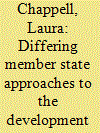| Srl | Item |
| 1 |
ID:
098422


|
|
|
|
|
| Publication |
2009.
|
| Summary/Abstract |
This article assesses the relative burden European members of NATO are bearing in the war in Afghanistan. Some argue that the current contribution of European forces is on par with the American contribution. However, current studies do not analyze Europe's ISAF contribution in comparison to some benchmark by which relative burden-sharing can be accurately determined. This article compares Europe's involvement in the war in Afghanistan to past missions, current contributions and in light of the benefits each country is likely to enjoy. The quantitative and qualitative findings show that there is an extensive amount of free-riding occurring both in terms of hard and soft power, although it varies across time and even within NATO Europe. Inadequate forces provided by European NATO countries jeopardize the likelihood of success in Afghanistan.
|
|
|
|
|
|
|
|
|
|
|
|
|
|
|
|
| 2 |
ID:
098420


|
|
|
|
|
| Publication |
2009.
|
| Summary/Abstract |
This article will analyse the challenges facing the Common Security and Defence Policy (CSDP) through an evaluation of the impact that differing member state strategic cultures have on the EU Battlegroup Concept, highlighted through the examples of Germany and Poland. The concept was initiated to give the EU an increased rapid reaction capacity. However, as emphasised through the cases of Germany and Poland, divergences in EU member states' strategic cultures remain, including when, where and how force is used. When this is combined with the cost of plugging military capabilities' gaps, the political willingness to deploy a Battlegroup can be affected. Whilst the article highlights that the role that member states want to play within CSDP as well as international expectations can override constraining factors, the Battlegroups rely on a rotation system. As some member states are more willing to deploy the Battlegroups than others, the concept risks becoming a declaratory policy thus undermining CSDP.
|
|
|
|
|
|
|
|
|
|
|
|
|
|
|
|
| 3 |
ID:
098421


|
|
|
|
|
| Publication |
2009.
|
| Summary/Abstract |
The article assesses the role of the EU in the Democratic Republic of Congo (DRC) and the ability of the EU to coordinate its different means and instruments with regard to the relationship between the European Commission and the Council. The article focuses on what is referred to as civil-military coordination (CMCO) in internal EU documents. The aim is to compare the four ESDP missions in DRC since 2003 with special regard to CMCO since the aim of the EU as a comprehensive security actor is to avoid artificial distinctions between military and civilian missions. Hence, the distinctiveness of ESDP derives precisely from its civil-military synergies, and a comparative perspective on CMCO could tell us more about how the EU has developed so as to become a comprehensive security actor in a country which is of importance for EU interests. The final part of the article assesses the impact on CMCO of the newly implemented Lisbon Treaty. A suitable institutional framework as devised for in the Treaty is essential so as to shape a framework that creates a timely as well as a comprehensive response to crises.
|
|
|
|
|
|
|
|
|
|
|
|
|
|
|
|
| 4 |
ID:
098419


|
|
|
|
|
| Publication |
2009.
|
| Summary/Abstract |
Scholars have largely overlooked a critical influence on the effectiveness of organizations in their conduct of peace operations: response duration. The consequences of prolonging the time between the demand and supply of a peace operation often include a rise in the death toll on the ground and a fall in the operation's legitimacy in the eyes of the local population. This paper aims to present and explain surprising variation among regional organizations' response rates - a critical influence on operations' prospects for success. The evidence that I have collected shows that despite its relative superior capacity, the European Union responds more slowly than the African Union and other less affluent regional organizations conducting similar peace operations. Applying theories of international organization pathologies, the paper argues that institutional design problems of bureaucratic dysfunction hinder organizations' abilities to rapidly respond.
|
|
|
|
|
|
|
|
|
|
|
|
|
|
|
|
| 5 |
ID:
098423


|
|
|
|
|
| Publication |
2009.
|
| Summary/Abstract |
The national research and development (R&D) base has in the post-cold war era gained increased importance in order to fill new security demands. There is a broadening of the search for security relevant science and technology involving more organizations and interests, scientific disciplines and nations. The question discussed in this article is if the premises of international, free and open R&D will be(come) compromised? Will we see more scientists, in their normal scientific activities, being accused of spying? The article suggests that such risks are not unrealistic to expect. Spy cases in less democratic countries could have consequences for scientists also in other countries. Outcomes depend on, among other things, the relative strengths of academic freedom and a political Identification Friend and Foe (IFF) component. United Nations and European Union resolutions restricting science education for students from Iran and North Korea in an attempt to prevent the spread of nuclear weapons illustrate a strong IFF component. Difficulties with regard to the implementation of these resolutions and other findings are presented in the final section of the article.
|
|
|
|
|
|
|
|
|
|
|
|
|
|
|
|